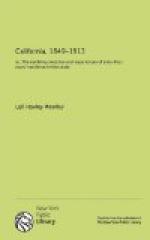Flood of ’61 and ’62.
The great flood of ’61 and ’62 was an occasion seldom known in the State. Early in December ’61 it commenced to rain in the valleys and snow in the mountains. In about two weeks it turned to rain in the mountains and valleys. The melting of the snow caused the rivers to rise very rapidly, the levees gave way and the waters flooded the city. The merchants commenced to put their goods on benches and counters, anywhere to keep them above water. Families who had an upper story to their house moved into it. The water continued to rise until it reached a point so that the boats running between Sacramento and San Francisco went up J and K streets and took people out of the second story of their houses. The islands were all flooded and there was great suffering along the river besides the great loss of property. This flood did more damage than any high water since ’49, but it was as an ill wind as far as it concerned my business, as I related previously.
Civil War Times In S. F.
In 1861 Dr. Wm. A. Scott, pastor of the Calvary Presbyterian church, on the north side of Bush street between Montgomery and Sansome streets, closed his services praying for the presidents of the Union and of the Confederate States. As soon as the benediction was pronounced Mrs. Thomas H. Selby smuggled him out of the side door into her carriage and off to her home, fearing the congregation, which had became a seething mob, might capture and do him bodily harm. There was no demonstration at this time but the next morning there was to be seen in effigy Dr. Scott’s form hanging from the top of the second story of a building in course of construction on the same block. It created some excitement for the time being, but it soon simmered out.
Lloyd Tevis was getting badly frightened about this time for fear his home on the corner of Taylor and Jackson streets would be destroyed and appealed to the police for protection. He was told to go home and drape his home in black. This he did most effectually, the occasion being the assassination of President Abraham Lincoln.
One of the exciting times in San Francisco in 1865 was when a mob went to the office of “The Examiner” on Washington street near Sansome and carried everything that was movable into the street and piled it up with the intention of burning. It seems that this paper was so pronounced in its sympathy with the cause of the Confederacy that it aroused such a feeling as to cause drastic measures. The police authorities were informed of what was going on and Colonel Wood, captain of police, got a squad of policemen together and proceeded to the scene, but their movements were so slow that it was hard to tell whether they were moving or not and by the time they had reached the place the boys had carried off nearly everything that had been thrown out. I have two pieces of type now that I picked up in the street about that time.




